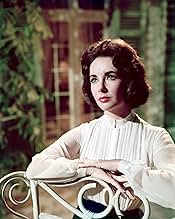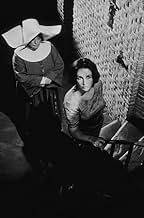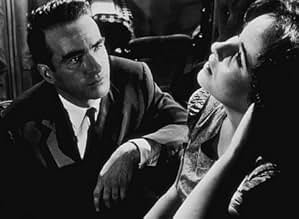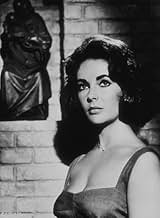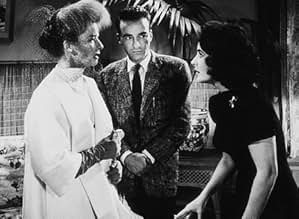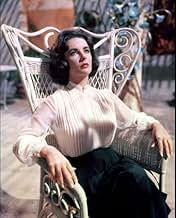IMDb RATING
7.5/10
18K
YOUR RATING
A surgeon is assigned the case of a young woman whose aunt wants her lobotomized to cover up a family secret.A surgeon is assigned the case of a young woman whose aunt wants her lobotomized to cover up a family secret.A surgeon is assigned the case of a young woman whose aunt wants her lobotomized to cover up a family secret.
- Nominated for 3 Oscars
- 4 wins & 7 nominations total
Sheila Robins
- Dr. Hockstader's Secretary
- (as Sheila Robbins)
Erik Chitty
- Asylum Inmate
- (uncredited)
Grace Denbeigh-Russell
- Asylum patient
- (uncredited)
Brenda Dunrich
- Nurse
- (uncredited)
Eddie Fisher
- Street Urchin
- (uncredited)
Anthony Lang
- Inmate
- (uncredited)
Aileen Lewis
- Nurse
- (uncredited)
Featured reviews
The moral majority's campaign to censor anything on the movie screen considered too taboo had an incredible impact on Hollywood during the 1930's right through to the 1970's. Censors went through Hollywood scripts, tearing out anything considered unspeakable, no matter how important it was to the plot at hand. It became an art form of sorts, for Hollywood film makers to veil their nasty little subjects so that the censors (who weren't that bright anyway) couldn't find it, but so that a smart audience could. Suddenly Last Summer is a classic example of this art in action.
Tennessee Williams was the toast of Broadway in the 1950's, with his melodramatic plays that often tackled heavy subjects such as addiction, adultery and in the case of this story, homosexuality. Katherine Hepburn plays a classic Tennessee Williams vamp, Violet Venable, a lady of means who is mourning the loss of her son. She has sought the help of a psychiatrist, played by Montgomery Clift, as she would like to have a lobotomy performed on her niece, who is apparently off her rocker (as most of Tennessee Williams' ladies are) and is spouting nasty rumors about the dead son.
Like most of Williams' work, Suddenly Last Summer flows along with over the top dialogue, the kind that actors love to sink their teeth into. I have not seen the original stage play but I suspect that this screenplay has been severely hacked to obliterate any talk of homosexuality. Venable's son was murdered while on vacation in Europe. If you take the dialogue literally you might believe that he was murdered for his religious convictions. If you read between the lines you will see that this was clearly a gay bashing.
Hepburn and Taylor both shine in their roles, that seem almost custom made for them. It's rare that Hepburn is cast as a villain, however, her performance leaves me wondering why she hasn't done it more often. Taylor's hyper-active hyper-ventilating, Catherine Holly works well here. Her own brand of melodramatic acting seems to compliment Williams' work.
Clift was a tad cardboard in his role as the psychiatrist, however, it is still interesting to watch this performance that was filmed after his face-altering car accident. One might think that he recently underwent a lobotomy. On the other hand, he is competent, and the performances of the actresses more than compensate.
Suddenly Last Summer works as a film, but I am hesitant to recommend to everyone. This is not an action flick, by any means, but rather a character piece. Scenes are long and they require your concentration, as important statements can be found between the lines. For fans of any of these actors, this is a must see!
Tennessee Williams was the toast of Broadway in the 1950's, with his melodramatic plays that often tackled heavy subjects such as addiction, adultery and in the case of this story, homosexuality. Katherine Hepburn plays a classic Tennessee Williams vamp, Violet Venable, a lady of means who is mourning the loss of her son. She has sought the help of a psychiatrist, played by Montgomery Clift, as she would like to have a lobotomy performed on her niece, who is apparently off her rocker (as most of Tennessee Williams' ladies are) and is spouting nasty rumors about the dead son.
Like most of Williams' work, Suddenly Last Summer flows along with over the top dialogue, the kind that actors love to sink their teeth into. I have not seen the original stage play but I suspect that this screenplay has been severely hacked to obliterate any talk of homosexuality. Venable's son was murdered while on vacation in Europe. If you take the dialogue literally you might believe that he was murdered for his religious convictions. If you read between the lines you will see that this was clearly a gay bashing.
Hepburn and Taylor both shine in their roles, that seem almost custom made for them. It's rare that Hepburn is cast as a villain, however, her performance leaves me wondering why she hasn't done it more often. Taylor's hyper-active hyper-ventilating, Catherine Holly works well here. Her own brand of melodramatic acting seems to compliment Williams' work.
Clift was a tad cardboard in his role as the psychiatrist, however, it is still interesting to watch this performance that was filmed after his face-altering car accident. One might think that he recently underwent a lobotomy. On the other hand, he is competent, and the performances of the actresses more than compensate.
Suddenly Last Summer works as a film, but I am hesitant to recommend to everyone. This is not an action flick, by any means, but rather a character piece. Scenes are long and they require your concentration, as important statements can be found between the lines. For fans of any of these actors, this is a must see!
10robb_772
Long-fabled as one of the most bizarre films to come out Hollywood during the years of the Production Code's strict enforcement, SUDDENLY, LAST SUMMER is a riveting psychological drama that remains absolutely gut-wrenching even after nearly fifty years since it's original release. Screenwriter Gore Vidal takes Tennessee Williams' one-act play and runs with it, fleshing out the central characters and expanding the story's central arc. Vidal had the seemingly impossibly task of taking a tale involving homosexuality, incest, pedophilia, and even cannibalism and presenting it all in a manner that would be acceptable to the rigid Production Code, yet still coherent to the average film audience. Not only did Vidal succeed victoriously, but the slightly ambiguous nature of the film's climax and denouncement actually makes the twice as unsettling and disturbing.
With relatively few characters to populate the story the performances are absolutely crucial, and the tight-knit cast delivers the goods in spades. Long after many of her acting contemporaries of the thirties and forties had been forgotten, Katharine Hepburn continued to reign supreme on the silver screen and her sublime performance as the manipulative and cunning Mrs. Venable ranks among Hepburn's best work of the decade. The wounded vulnerability of a post-car accident Montgomery Clift serves him well in a difficult role as the middle man between the film's leading ladies, and the still-handsome actor provides a humane, completely genuine performance that supplies viewers with level-headed window into the off-kilter story. Albert Dekker, Mercedes McCambridge and Gary Raymond also excel in minor roles.
The film's biggest surprise, however, is the exceptional portrayal of Elizabeth Taylor in the film's central performance. Although usually somewhat of an uneven actress, Taylor completely nails a dauntingly difficult role in a complex, multilayered performance that deservedly won her a Golden Globe Award as well as her third consecutive Oscar nomination. During the film's climatic revelation, Taylor lets out a series of bone-chilling screams that I could never imagine coming out of any other actress. Not only does it remain Taylor's finest performance (which is a considerable achievement when one considers that WHO'S AFRAID OF VIRGINIA WOOLF is also on her resume), but it is also a performance that simply could not be bettered.
Although perhaps he could never surpass 1949's A LETTER TO THREE WIVES or 1950's ALL ABOUT EVE in the eyes of most viewers, SUMMER contains some of the finest work of director Joseph L. Mankiewicz' legendary career. Brilliantly combining southern Gothicism with straight-faced psychodrama and even grandiose horror, Mankiewicz stitches the various seemingly disparate threads together in a harrowing, yet perversely satisfying whole. Even the lengthy, sometimes criticized flashback sequence is an absolute tour de force of film-making that leaves viewers emotionally exhausted as one experiences the on screen turmoil more than simply watching it. An often unheralded classic, the film remains of the most sorely underrated films of its era.
With relatively few characters to populate the story the performances are absolutely crucial, and the tight-knit cast delivers the goods in spades. Long after many of her acting contemporaries of the thirties and forties had been forgotten, Katharine Hepburn continued to reign supreme on the silver screen and her sublime performance as the manipulative and cunning Mrs. Venable ranks among Hepburn's best work of the decade. The wounded vulnerability of a post-car accident Montgomery Clift serves him well in a difficult role as the middle man between the film's leading ladies, and the still-handsome actor provides a humane, completely genuine performance that supplies viewers with level-headed window into the off-kilter story. Albert Dekker, Mercedes McCambridge and Gary Raymond also excel in minor roles.
The film's biggest surprise, however, is the exceptional portrayal of Elizabeth Taylor in the film's central performance. Although usually somewhat of an uneven actress, Taylor completely nails a dauntingly difficult role in a complex, multilayered performance that deservedly won her a Golden Globe Award as well as her third consecutive Oscar nomination. During the film's climatic revelation, Taylor lets out a series of bone-chilling screams that I could never imagine coming out of any other actress. Not only does it remain Taylor's finest performance (which is a considerable achievement when one considers that WHO'S AFRAID OF VIRGINIA WOOLF is also on her resume), but it is also a performance that simply could not be bettered.
Although perhaps he could never surpass 1949's A LETTER TO THREE WIVES or 1950's ALL ABOUT EVE in the eyes of most viewers, SUMMER contains some of the finest work of director Joseph L. Mankiewicz' legendary career. Brilliantly combining southern Gothicism with straight-faced psychodrama and even grandiose horror, Mankiewicz stitches the various seemingly disparate threads together in a harrowing, yet perversely satisfying whole. Even the lengthy, sometimes criticized flashback sequence is an absolute tour de force of film-making that leaves viewers emotionally exhausted as one experiences the on screen turmoil more than simply watching it. An often unheralded classic, the film remains of the most sorely underrated films of its era.
While the symbolism here is about as heavy as a sledgehammer, it's offered in such artfully poetic style that only writers of the caliber of Tennessee Williams and Gore Vidal could give us. What they have done is provide KATHARINE HEPBURN with a role that fits her like a glove and where her mannered acting sits comfortably on a role she was born to play. She is totally mesmerizing as Mrs. Venable, a woman who has lavished all her hopes and dreams on her only son only to have them all swept away on a brutal summer day, "suddenly, last summer", under the hot Mediteranean sun. She gets to spout the most poetic dialog in the film, with ELIZABETH TAYLOR not far behind, especially during their frequent monologues.
This leaves MONTGOMERY CLIFT, as a surgeon who is asked to perform a lobotomy on Miss Taylor, hovering in the background and looking like a frightened sparrow most of the time, although it is he who uncovers the truth about last summer. Mr. Clift must have been at a difficult phase of his own personal life because he performs in a stiff, robot-like manner that makes him seem dubious as a skilled surgeon with steady hands.
All of this is highly melodramatic as only Tennessee Williams can muster, while at the same time affording us the luxury of watching two commanding performances from Hepburn and Taylor that were justifiably nominated for Oscars.
The tale seems burdened by too much heavy-handed poetry but somehow it holds the attention because of the forceful acting by a fine cast. Mercedes McCambridge is a standout as Taylor's mother in the sort of fluttery, birdbrain role one might suspect would be offered to Billie Burke if this had been filmed in the 1940s.
By the end of the film, Miss Hepburn is so far removed from reality that she thinks Dr. Sugar (Montgomery Clift) is her son Sebastian and seems more like a candidate for lobotomy than the plucky Miss Taylor. Taylor never quite has the air of vulnerability that the role demands, but she gives a colorful, if strident, performance as the poor victimized girl who was used as bait by her playboy cousin.
This leaves MONTGOMERY CLIFT, as a surgeon who is asked to perform a lobotomy on Miss Taylor, hovering in the background and looking like a frightened sparrow most of the time, although it is he who uncovers the truth about last summer. Mr. Clift must have been at a difficult phase of his own personal life because he performs in a stiff, robot-like manner that makes him seem dubious as a skilled surgeon with steady hands.
All of this is highly melodramatic as only Tennessee Williams can muster, while at the same time affording us the luxury of watching two commanding performances from Hepburn and Taylor that were justifiably nominated for Oscars.
The tale seems burdened by too much heavy-handed poetry but somehow it holds the attention because of the forceful acting by a fine cast. Mercedes McCambridge is a standout as Taylor's mother in the sort of fluttery, birdbrain role one might suspect would be offered to Billie Burke if this had been filmed in the 1940s.
By the end of the film, Miss Hepburn is so far removed from reality that she thinks Dr. Sugar (Montgomery Clift) is her son Sebastian and seems more like a candidate for lobotomy than the plucky Miss Taylor. Taylor never quite has the air of vulnerability that the role demands, but she gives a colorful, if strident, performance as the poor victimized girl who was used as bait by her playboy cousin.
In 1930's New Orleans, a wealthy and eccentric older woman named Mrs. Venable (Katharine Hepburn), wants a surgeon (Montgomery Clift) to perform a lobotomy on her niece (Elizabeth Taylor), for reasons that become clear toward the end of the film. This macabre Tennessee Williams story, with overlapping adult themes, must surely have been a shock to audiences in 1959. The film provides a great vehicle for the talents of both Hepburn whose acting is engaging, and Taylor whose performance is superb.
The Mankiewicz script is very talky. The characters of both Hepburn and Taylor engage in lengthy and at times tedious monologues. In all that talking, at least there are some really good lines. My favorite is near the beginning. In a nonchalant tone, Mrs. Venable tells us about the daily vicissitudes of Lady, the Venus flytrap that Mrs. Venable keeps in her garden. "Lady must be kept under glass, and while she is under glass, we have to provide her with flies, flown in at great expense." Priceless.
As one would expect for a film derived from a stage play, cinematography and music are less important than dialogue and acting. "Suddenly Last Summer" is worth viewing for its unusual story, and for the acting accomplishments of Hepburn and Taylor.
The Mankiewicz script is very talky. The characters of both Hepburn and Taylor engage in lengthy and at times tedious monologues. In all that talking, at least there are some really good lines. My favorite is near the beginning. In a nonchalant tone, Mrs. Venable tells us about the daily vicissitudes of Lady, the Venus flytrap that Mrs. Venable keeps in her garden. "Lady must be kept under glass, and while she is under glass, we have to provide her with flies, flown in at great expense." Priceless.
As one would expect for a film derived from a stage play, cinematography and music are less important than dialogue and acting. "Suddenly Last Summer" is worth viewing for its unusual story, and for the acting accomplishments of Hepburn and Taylor.
This screen version, by Joseph L Mankiewicz, of Tennessee Williams' play isn't as highly thought of as it should be. It's not a classic and on occasions it comes over as crude and stilted, but it also has many fine things going for it. Although he never really opens it out, Mankiewicz gives it a fluency that isn't at all theatrical and although he often films scenes intimately and between only two characters, he ensures it is photographed and cut in a very cinematic fashion.
Unfortunately, one of the two people on screen during these 'cinematic' sequences is Montgomery Clift who is at his worst here. It was after his accident and he looks as if he's in pain. When he walks it's as if there is a board up his back and he talks as if out of the side of his mouth. Luckily, with him in these scenes is either Elizabeth Taylor or Katharine Hepburn or both and when they are on screen you don't pay too much attention to Clift.
Dilys Powell said Elizabeth Taylor was born to play Tennessee Williams and she was right. Indeed this may be her best performance after "Virginia Woolf". Catherine's lines don't have the kind of poetry in them that Violet Venable's does but Taylor finds a poetry of her own in her readings. She builds on her long speech at the end and is very moving, even if Mankiewicz can't resist 'showing' us, in flashbacks, what Taylor is telling us, as if he doesn't trust an audience to sit still and just listen to Taylor. (They would have to in the theatre).
As Violet, Hepburn has the showier part and she milks it for all it's worth. It's a great piece of acting because Violet never seems to be acting, though she tends to think of her life as a kind of performance, something she has passed on to her homosexual son, Sebastian. (If the old adage, 'my mother made me a homosexual', has any validity you don't have to look any further than here). She enters from above, descending in her small baroque lift, and Hepburn can see the comic potential in such an entrance. Moments later, however, she is recounting how the sea-turtles were devoured by flesh-eating birds in the Galapogos, and you can see just how dangerously unstable this woman really is.
Any film that has acting of this calibre automatically qualifies as worth seeking out, (you forgive the lame work of Clift and Gary Raymond and draw a blind over Mercedes McCambridge, though Albert Dekker is very fine), but this qualifies on other grounds; as one of the better Tennessee Williams adaptations, (he co-wrote it with Gore Vidal), as a flawed, dated but strangely fascinating example of how Hollywood viewed homosexuality at the time, (negatively, naturally, but any face, no matter how horribly distorted, so long as it was in the public gaze, was better than no face at all), and as a serious addition to the Joe Mankiewicz canon.
Unfortunately, one of the two people on screen during these 'cinematic' sequences is Montgomery Clift who is at his worst here. It was after his accident and he looks as if he's in pain. When he walks it's as if there is a board up his back and he talks as if out of the side of his mouth. Luckily, with him in these scenes is either Elizabeth Taylor or Katharine Hepburn or both and when they are on screen you don't pay too much attention to Clift.
Dilys Powell said Elizabeth Taylor was born to play Tennessee Williams and she was right. Indeed this may be her best performance after "Virginia Woolf". Catherine's lines don't have the kind of poetry in them that Violet Venable's does but Taylor finds a poetry of her own in her readings. She builds on her long speech at the end and is very moving, even if Mankiewicz can't resist 'showing' us, in flashbacks, what Taylor is telling us, as if he doesn't trust an audience to sit still and just listen to Taylor. (They would have to in the theatre).
As Violet, Hepburn has the showier part and she milks it for all it's worth. It's a great piece of acting because Violet never seems to be acting, though she tends to think of her life as a kind of performance, something she has passed on to her homosexual son, Sebastian. (If the old adage, 'my mother made me a homosexual', has any validity you don't have to look any further than here). She enters from above, descending in her small baroque lift, and Hepburn can see the comic potential in such an entrance. Moments later, however, she is recounting how the sea-turtles were devoured by flesh-eating birds in the Galapogos, and you can see just how dangerously unstable this woman really is.
Any film that has acting of this calibre automatically qualifies as worth seeking out, (you forgive the lame work of Clift and Gary Raymond and draw a blind over Mercedes McCambridge, though Albert Dekker is very fine), but this qualifies on other grounds; as one of the better Tennessee Williams adaptations, (he co-wrote it with Gore Vidal), as a flawed, dated but strangely fascinating example of how Hollywood viewed homosexuality at the time, (negatively, naturally, but any face, no matter how horribly distorted, so long as it was in the public gaze, was better than no face at all), and as a serious addition to the Joe Mankiewicz canon.
Did you know
- TriviaAccording to author Garson Kanin in his memoir "Tracy and Hepburn," Katharine Hepburn was reportedly so furious at the way Montgomery Clift was treated by producer Sam Spiegel and director Joseph L. Mankiewicz during filming that, after making sure that she would not be needed for retakes, she told both men off and actually spat at them (although it remains unclear just which one of the two she spat at, or if she spat at both).
- GoofsAlthough set in 1937, costumes, hairstyles and makeup worn by Dame Elizabeth Taylor are all contemporary in 1959.
- Quotes
Catherine Holly: Is that what love is? Using people? And maybe that's what hate is - not being able to use people.
- ConnectionsEdited into Michael Jackson's This Is It (2009)
Details
- Release date
- Countries of origin
- Language
- Also known as
- Suddenly, Last Summer
- Filming locations
- Begur, Girona, Catalonia, Spain(village and old castle scenes)
- Production companies
- See more company credits at IMDbPro
Box office
- Budget
- $3,000,000 (estimated)
- Gross worldwide
- $9,830
- Runtime1 hour 54 minutes
- Color
- Aspect ratio
- 1.85 : 1
Contribute to this page
Suggest an edit or add missing content




